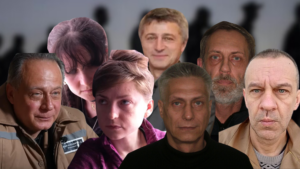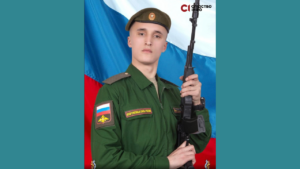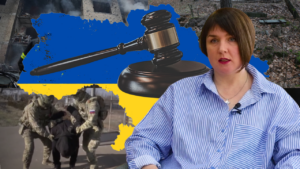“The world isn’t fighting just for the sovereignty of Ukraine, it is fighting for the observance of the world order,” — Mark Ellis

Mark Ellis is an international criminal law expert and the executive director of the International Bar Association. Last September, he came to Ukraine to sign memorandums of cooperation with the Prosecutor General’s Office, the Ministry of Defense, and the Ministry of Justice.
This year, Mark Ellis returned to meet with Ukrainian lawyers engaged in war crimes cases and to attend United for Justice, a conference hosted by Lviv. Mark Ellis is the chair of the UN-created Advisory Panel on Matters Relating to International Criminal Tribunals.
MIHR has met with Dr. Ellis to discuss the most painful issues of Ukrainian justice and asked what he thinks of a tribunal for senior political and military leaders of Russia, trial of cases by Ukrainian courts, and support by the international community.
Mark, this is your second visit to Ukraine after the full-scale invasion. Obviously, you already have an idea of the scale of proceedings initiated by the prosecutor’s office into war crimes. To what extent do you think the Ukrainian system is capable to investigate all these crimes?
—You are right, the scale is unrelenting. Investigating and bringing to justice those who committed these crimes is an enormous challenge for any country. In my opinion, Ukraine is quite unique in its drive to prosecute war criminals and bring to justice those guilty of crimes. Ukraine is aware of the complexity of this process and very open to international assistance. And that’s impressive.
Everyone I talked to during my visits said they wanted Ukraine to conduct domestic trials properly and in accordance with international standards. So, I am confident that Ukraine has the ability to conduct these domestic proceedings, no matter how complex they may be.
However, Ukraine has not ratified the Rome Statute. Experts share a concern that the Ukrainian legislative framework has no adequate capacity to investigate international crimes…
—Of course, I would like Ukraine to become State Party to the Rome Statute. As for the investigation of crimes, I believe that Article 438 of the Criminal Code of Ukraine (Violation of the Laws and Customs of War.—MIHR) covers a great part of them. So, I am not really concerned about it.
The fact is that the International Criminal Court will focus on the highest level perpetrators of crimes, on top leaders. Domestic courts, on the other hand, should consider as many cases as possible about crimes committed by Russian soldiers.
“Ukraine wants to show the international community that Ukraine is willing and able to conduct trials according to international standards of fairness and impartiality”
Many international experts say that war crimes in Ukraine are being investigated hastily, that prosecutors should pay more attention to details. For example, during the first case after the full-scale invasion against Russian soldier Shishimarin, the prosecution failed to focus on the role of the defendant’s commander in this crime. I think this is because the concept of command responsibility is missing from the Criminal Code of Ukraine.
—Yes, specific focus matters. But most importantly, Ukraine must ensure that these domestic trials are transparent and of high quality for each defendant. Because Ukraine wants to show the international community that Ukraine is willing and able to conduct trials according to international standards of fairness and impartiality.

Vadim Shishimarin at the trial. Photo credit: MIHR
A lot depends on education. It helps that judges, prosecutors, and defends lawyers receive further training and gain experience in the area of international criminal law. I remain confident that Ukraine will conduct proper trials. Nothing I have seen makes me doubt that these challenges will be met.
The Ukrainian government is actively promoting the creation of a tribunal for the crime of aggression. But this is a debatable issue. When talking about victims’ interests, we understand that many crimes against them may not be investigated due to the low capability of national mechanisms. There is an idea of inviting international judges to our national system. Or adding the option of investigating other types of crimes to this aggression tribunal. Which model do you think would work the best?
—The special tribunal for the crime of aggression should focus on the crime of aggression and not on other crimes. It should be separate and investigate the actions of top figures of the Russian government, starting with Putin. It should be an international tribunal supported by as many states as possible and, hopefully, supported by some of the major states, which should participate in it.
I do not think that the special tribunal for the crime of aggression should be a hybrid court here in Ukraine. I am not sure that this would give Ukraine the full flexibility that is needed in domestic proceedings. We also have the International Criminal Court that will do this job and Universal jurisdiction, that will also help with accountability.
As for the hybrid approach, I don’t find it a good idea. There is a sense that Ukraine is able to investigate the crime of aggression through its domestic proceedings. But I believe it would help to raise international support for the courts if an international tribunal for the crime of aggression is created.
You brought up universal jurisdiction. What do you think are the most promising countries for this?
—It is hard to name specific countries, but there are about 14 of them in Europe. European countries earlier initiated the investigation of crimes committed by Russia in Ukraine, based on the principle of universal jurisdiction. So, they are activating this principle.
Most European countries have conditional universal jurisdiction. This means that the suspect or the victim must be in their country in order to investigate. But the principle is still important.
I think most countries will be able to investigate certain crimes with a centralized database. In my opinion, universal jurisdiction would be a good addition to other accountability mechanisms. But I don’t think it will be the main mechanism.
“Genocide must be investigated. If you listen to Putin and what he thinks about Ukrainians, you can understand that this intent exists. And the forcible transfer of children is an element of genocide”
The Prosecutor General’s Office is currently focused on the crime of genocide. People view this skeptically, claiming that the crime of genocide is too difficult to prove. How promising is it, in your opinion?

Mark Ellis with the Prosecutor General of Ukraine, Andriy Kostin. Photo credit: Prosecutor General’s Office
—The crime of genocide is challenging because it requires proof of a specific intent to destroy a whole part or group based on their race, religion, nationality, or ethnicity. That is, there must be evidence of this specific intent. And that is why genocide is often by default crimes against humanity, because this category does not require proof of a specific intent in order to bring criminals to justice.
But genocide must be investigated. If you listen to Putin and what he thinks about Ukrainians, you can understand that this intent exists. And the forcible transfer of children is an element of genocide.
So, I think it would be a mistake to stop focusing on this crime and amassing evidence. I believe, you will be able to demonstrate that specific intent for genocide against Ukrainians.
Let’s go back to your professional activity-lawyers. Do you communicate with Ukrainian lawyers? How well do you think they work, are prepared for war crimes trials, in particular in absentia?
—We have a special interest and are focused on building capacity and legal professionalism in this area. That is why we work with the Ministry of Justice and the Center for Legal Aid. We have a memorandum with them to this effect. They recognize the need for additional training, so we have created lectures and training programs for lawyers.
Last time I was here, I heard that there was public pressure on lawyers who take on the defense of Russian suspects and defendants. And I can appreciate this emotional component. But Ukraine is a part of the international community, so these trials should be in contrast to how Russia does it.
For justice to prevail, you must have a solid, competent defense, even for those accused of these horrific war crimes. This is required by law. And I think that there are enough Ukrainian lawyers who understand this. I hope that we can continue to communicate with the public explaining why this matters for Ukraine.
“I can get many trial observers, but nothing compares to the competence of local civil society”
The Media Initiative for Human Rights has been monitoring war-related trials since 2016. These are crimes that date back as far as 2014. Most proceedings are in absentia. What we saw is that the media and society show little interest in these trials, and I am afraid that we are faced with the fact that interest in new trials will fade in a year or two. They will be held without the interest of and control by civil society. Do you have an idea how to engage society with these matters? Maybe, your experience of other conflicts can help here?

Mark Ellis and MIHR coordinator Olha Reshetylova during the interview
—Control by civil society, that is, your observation is key to this process. There is nothing better. I can get many trial observers, but nothing compares to the competence of local civil society. You can do it much better than we can. You know the language, and the legal system. So, the best thing the international community can do is continue to support local organizations in monitoring trials, writing reports. But you’re right, interest is going to wane over time. This is not unique to Ukraine, it happens. This is human nature.
When we were in The Hague last December at the Assembly of States Parties to the International Criminal Court, we felt other affected countries’ competitiveness about Ukraine. Amnesty International even made banners comparing amounts allocated for investigations in Ukraine and in other countries. It seems that there is no understanding outside the Western world of the importance of investigation and justice regarding the aggression of the Russian Federation against Ukraine.
—There will always be a struggle for resources and attention between stakeholders. Ukraine has thoroughly grabbed the attention of the world, especially Europe. But the Ukrainian conflict is sadly not relevant to a number of countries in the world, it is not something they focus on. Thus, we must be realistic. After talking to my colleagues from India, South Africa, and Latin America, it became clear to me that Ukraine is not a priority for them. They feel that it is irrelevant and too far away, and I understand their views, but I do not agree with them. Everyone knows that Europe is focused on Ukraine. This is natural since Ukraine is located in Europe, so we have an ongoing European conflict, a crisis of the day that needs to be addressed.
And potential major “crises” prevented.
—Yes. And I don’t think the international community is giving up its focus on other parts of the world. The ICC conducts other investigations, too.
“The world isn’t fighting just for the sovereignty of Ukraine, it is fighting for the observance of the world order that took shape after WWII. And I think it’s worth fighting for.”
More than a thousand civilian hostages are being held in the occupied territory and sent to Russian pretrial detention centers. Our organization alone identified 923 civilian hostages secretly held in Russian prisons as of the end of February. All the rules created by the world after WWII have been broken by Russia. They do not grant the International Committee of the Red Cross access. UN missions and UN committees cannot do anything, either. Do you think the international community should create new mechanisms to help these people?
—Yes, we have a global legal order — rules, regulations, treaties. WWII was followed by a transformation of world politics, focused on human rights and the responsibility of states for failure to respect these rights. International justice was also significantly transformed after the end of WWII. Each state should adopt and adhere to these rules.
But when a country like Russia imposes its own rules, when it violates international principles, I believe that the international community has the obligation to respond and oppose these unlawful actions. This is the inevitable response that must happen.
It especially matters this time because the world isn’t fighting just for the sovereignty of Ukraine, it is fighting for the observance of the world order that took shape after WWII. And I think it’s worth fighting for.
What are your impressions after your second visit to Ukraine, in particular after the United for Justice forum in Lviv, which you attended? Are we moving forward fast enough or do we need to move faster?
—The forum in Lviv affirmed the unity of both the Ukrainian authorities and international representatives over the fact that Russia and its leaders should be held accountable both for the crime of aggression and for the war crimes that are taking place in Ukraine right now.

Mark Ellis at the United for Justice Forum in Lviv. Photo credit: Prosecutor General’s Office
I truly hope that Ukraine will get significant support from its Western allies, and you will be able to propel Russia out of your country. The next few months will be critical for Ukraine.
I was very inspired by the Ukrainian people during my first visit in September. I was in Ukraine earlier too, right after it gained independence in the 1990s, so I am deeply in love with your country. It is special to me. So, I am particularly interested to see the Ukrainians succeed in everything.
This article was prepared by the Media Initiative for Human Right supported by the Hela Sverige Skramlar for Ukraina project.







